Marijuana Use and Pregnancy
Conflicting evidence on how cannabis may affect expectant mothers and their babies leads to more questions than answers.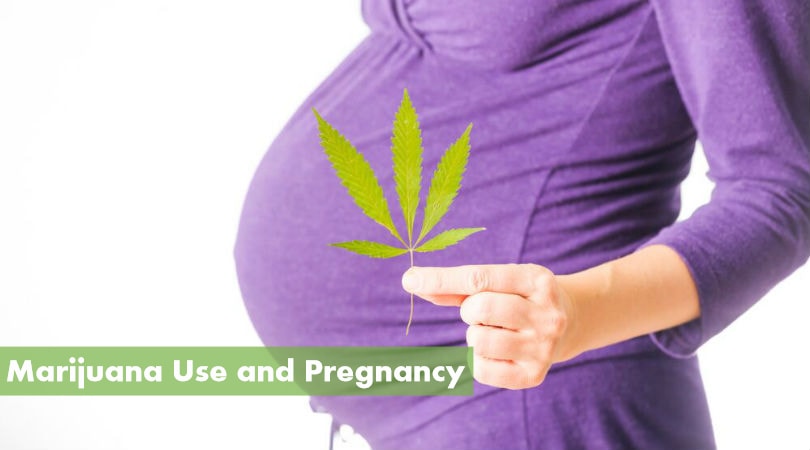
Despite the growing legal and medicinal acceptance of cannabis, the use of marijuana during pregnancy remains a polarizing topic. Some studies suggest that babies may benefit from being exposed to cannabis in the womb, while other research points to prenatal cannabis exposure as the cause of lower birth weights, behavioral problems, and disrupted brain development. At this time, there are very few clear answers about the effects of marijuana on babies in the womb. Here’s what we know so far:
Marijuana and pregnancy
There is no definitive evidence that using weed during pregnancy is either beneficial or detrimental to the developing baby. Clinical research on this topic has been very limited, and those studies that have been done have considerable limitations. It is unethical to test a potential teratogen on pregnant women, so the studies that can be done tend to be based on self-reported information and come from small sample groups. It’s likely that an accurate representation of all expectant mothers who use marijuana is not achieved in these studies, as they are limited only to women who are willing to be candid about their marijuana use. Pregnant women who use marijuana may elect not to participate or may underreport their actual usage, for fear of legal repercussions or negative social judgment. To further cloud the answers, the results of the studies that have been done often directly contradict each other.
The medicinal properties of cannabis have received a substantial amount of attention in recent years, with many users claiming weed to be the only substance that provides effective relief from afflictions such as chronic pain, anxiety, or insomnia. Many women who use marijuana to relieve these and other symptoms, which can stem from a wide range of medical and mental health conditions, may be understandably reluctant to stop during pregnancy.
Q: Does marijuana affect pregnancy?
A: There isn’t enough evidence to ascertain whether the overall effects of marijuana on pregnancy are positive, negative, or insignificant. Marijuana is known to relieve many common pregnancy side effects, but it is still unknown if it’s safe to use it while pregnant.
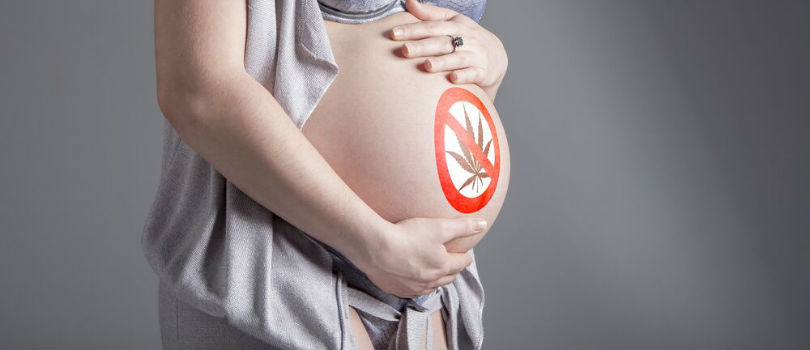
There is no definitive evidence that using weed during pregnancy is either beneficial or detrimental to the developing baby.
Can you smoke weed while pregnant?
Pregnancy is not a contraindication for medical marijuana in Canada and any U.S. states where it is presently legal. This means that you can still obtain your prescribed dose of cannabis as usual while pregnant. However, this does not mean that cannabis can be considered cleared for use during pregnancy. The governments of each country or state where medical marijuana is legal have issued recommendations that pregnant women do not use marijuana products of any sort. At this time, all major health organizations, including the American Academy of Pediatrics (AAP) and American College of Obstetrics and Gynecology (ACOG) are also recommending abstinence from weed during pregnancy.
The law and cannabis use during pregnancy
There are potential legal ramifications from using cannabis during pregnancy, even if you have a prescription for medical marijuana or live in a state where recreational use is legal. Even reporting medicinal marijuana use to your midwife or obstetrician can be risky. Hospitals do sometimes drug test newborn babies and are required to notify child protective services if a baby tests positive for THC (tetrahydrocannabinol), the psychoactive component of weed. The consequences of a baby testing positive for THC range from new mothers being subjected to mandatory regular drug testing, welfare checks, and completion of parenting and/or drug education classes, all the way up to having child custody revoked. Many mothers who, in the interest of transparency in their medical care, disclosed marijuana use to their doctor have been surprised to find child welfare agencies involved in their lives immediately after their child’s birth. CBD products that do not contain THC, including hemp-derived CBD oil (not cannabis-derived CBD oil), will not negatively impact a drug test. It may be wise to speak with a lawyer prior to disclosing any marijuana use to your doctor if you are pregnant or breastfeeding.
Q: Can you smoke weed while pregnant?
A: While there are currently no restrictions prohibiting the prescription of medical marijuana to pregnant women, there are potential legal consequences of using THC during pregnancy. Despite the lack of conclusive evidence on whether cannabis is harmful to pregnant women or fetuses, all prominent medical organizations presently recommend abstinence from cannabis during pregnancy.
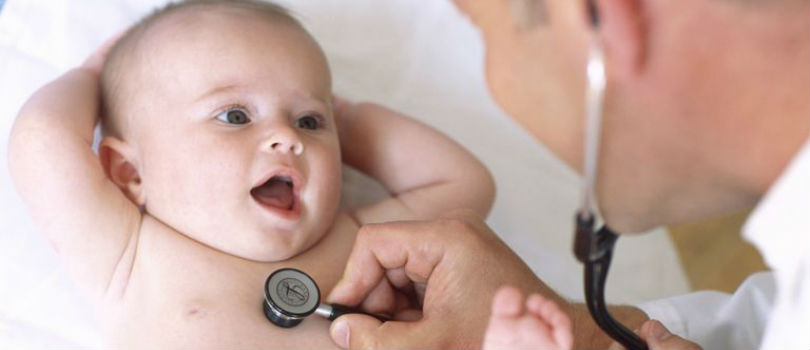
Hospitals do sometimes drug test newborn babies and are required to notify child protective services if a baby tests positive for THC.
Benefits of smoking weed while pregnant
Smoking cannabis does provide fast-acting results, and it’s possible that, if used sparingly, this method may not cause significant detriment to expectant mothers or their babies. However, there is no amount of smoking during pregnancy that is considered to be safe. If at all possible, using marijuana in a different form, such as cannabis oil, is likely to do less harm.
Nausea relief
Cannabis has been used as an aid for unpleasant pregnancy side effects for centuries, all over the world. Cannabis is most frequently used to relieve pregnancy-related nausea or “morning sickness” as it’s typically called (although it can actually occur at any time of day). Some pregnant women experience a condition called hyperemesis gravidarum (HG). HG is a more severe version of morning sickness, in which nausea may be near-constant and it’s difficult to keeping food or beverages down. This can result in dehydration and weight loss, both of which can be dangerous during pregnancy. Most cases of HG improve roughly halfway through the pregnancy, although some last the entire 40+ weeks.
Increase in appetite
Another potential pregnancy benefit of cannabis is its ability to increase appetite. Some pregnant women experience food aversions, which can make getting enough calories to support a healthy pregnancy a challenge. In southeast Jamaica, although generally discouraged by the government, marijuana is an extremely common treatment for nausea and appetite stimulation during pregnancy.
Relief of insomnia and fatigue
Insomnia and fatigue are common pregnancy side effects. There are various strains of weed that have either energizing or sedative qualities and could help to alleviate these conditions.
Pain relief
Many pregnant women experience aches and pains from ligaments stretching, as well as growing pressure and stress on the spine and pelvic area. Marijuana can provide effective pain relief.

There is no amount of smoking during pregnancy that is considered to be safe. Using marijuana in a different form, such as cannabis oil, is likely to do less harm.
Mood stabilization and relief from stress and anxiety
Mood swings, anxiety, and stress are common side effects of pregnancy, as hormone levels change and women adjust to the enormous life change at hand. Some strains of cannabis can provide relief from anxiety and stress, and help to keep moods relatively stable.
Side effects of smoking weed while pregnant
Smoking weed – or anything else – can be detrimental to both pregnant women and their unborn babies. Smoke contains carcinogens, tar, and carbon monoxide, in addition to other toxins, just as tobacco cigarettes do. If you smoke near other people, they will also be exposed to these toxins. Carbon monoxide, in particular, reduces the amount of oxygen carried through the bloodstream, which results in reduced oxygen and other nutrients getting to the baby. Coughing and increased phlegm can also be side effects of smoking regularly. Toward the end of her pregnancy, a woman’s lung capacity decreases, due to pressure from the growing uterus on all of the surrounding organs. This may make smoking difficult or more uncomfortable in late pregnancy.
Vaping weed while pregnant
Vaporizing or “vaping” weed also has the potential to be somewhat safer than smoking it, as the cannabis oil or buds used are heated instead of combusted. However, this has not been studied at length. Preferring to err on the side of caution, the Centers for Disease Control and Prevention (CDC) has stated that pregnant women should completely abstain from the use of electronic smoking devices. If you are going to use cannabis while pregnant, it’s likely safer to use a method other than smoking or vaporizing. Cannabis oil is generally considered the safest delivery method, as it’s easiest to control the dose amount, and the detrimental effects of smoking are avoided.
Q: Does smoking weed while pregnant harm the baby?
A: There isn’t enough evidence to say whether maternal cannabis use can harm babies in the womb. However, smoking anything (including weed) is not recommended during pregnancy, as it exposes the fetus to toxins and restricts the flow of oxygen and other nutrients that the baby receives through the mother’s bloodstream.
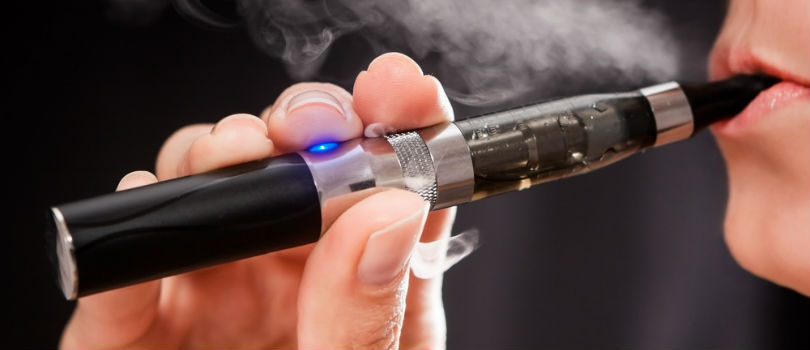
If you are going to use cannabis while pregnant, it’s likely safer to use a method other than smoking or vaporizing.
More potential side effects of using cannabis while pregnant
If you elect to use marijuana in a non-smokable form during pregnancy, there are still potential side effects to be aware of. Cannabis that contains THC can cause euphoria (feeling “high”), sleepiness, feelings of anxiety and paranoia, and also increased hunger. If you are already experiencing fatigue, anxiety, or significantly increased appetite during your pregnancy, cannabis high in THC may amplify these conditions. Depending on the chemical makeup of the strain of cannabis used, increased energy is another potential side effect. THC tolerance levels vary greatly from person to person, and a dose that makes one person anxious and restless may have a sedative or pleasurable effect on another.
THC has been shown to cross the placenta, though the fetus appears to be exposed to a significantly diluted concentration, compared to the mother. At this point, no studies have been done that can determine whether the fetus experiences any side effects due to this exposure.
Smoking weed in early pregnancy
Many women who regularly use marijuana are still smoking it before they know they are pregnant. Some of these women use weed recreationally, but many others use it to manage chronic pain, depression, or a number of other conditions. Though the current stance of all major health organizations is that marijuana use should be discontinued during pregnancy, many pregnant women keep using weed to get through the first trimester (the first twelve weeks of pregnancy), when nausea, vomiting, emotional/mood instability, and loss of appetite are common symptoms – symptoms that marijuana tends to provide significant relief from.
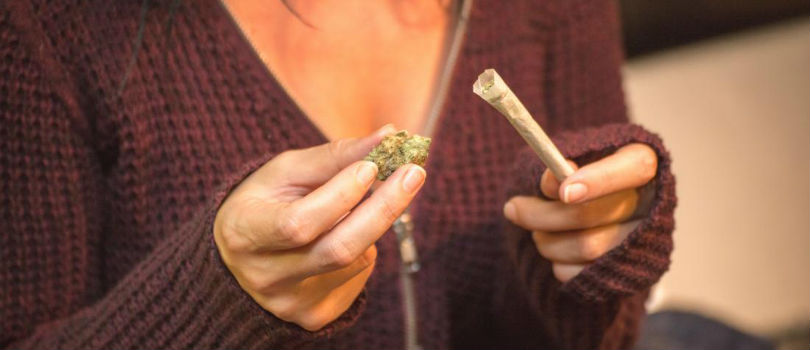
Many women who regularly use marijuana are still smoking it before they know they are pregnant.
Very little research has been done on how maternal marijuana use affects the fetus in the first trimester. It is known that human bodies produce their own cannabinoids, a type of chemical compound found in marijuana (THC and CBD are two well-known cannabinoids). Many body processes are governed by this “endocannabinoid system,” including movement, mood, and sleep cycles. Research has shown that these endocannabinoids help to facilitate the implantation of an embryo in the uterus, where it can then grow into a fetus, as well as the development of the fetus’s brain. It stands to reason that the use of marijuana, which contains over 100 known cannabinoids, has the potential to disrupt these processes. Concern over THC, in particular, adversely affecting neurological development is the primary reason health organizations currently cite when recommending pregnant women abstain from cannabis.
CBD and pregnancy
Anecdotal evidence shows that CBD has the potential to alleviate many common pregnancy side effects, from aches and pains and insomnia to anxiety and depression. However, since CBD has not yet been approved by the FDA (Food and Drug Administration), it cannot be used in clinical trials. So there are still no definitive answers on whether CBD is safe for use by pregnant women, or on how it affects the developing fetus. Most research done so far on marijuana and pregnancy has focused solely on the effects of THC. CBD has a markedly different effect on the body and is widely considered to be safer than THC. This is primarily due to CBD not being psychoactive, and therefore unable to get you “high.” Of course, this does not necessarily mean that CBD is safe for use during pregnancy. Considering THC’s combined pregnancy-use risk factors – potential detriment to fetal development and legal and/or child custody repercussions, sticking to hemp-derived CBD oil, which does not contain THC, is likely the safest option if you do choose to use cannabis while pregnant.
THC and pregnancy
Considering the questionable legal status of THC, it is advisable to avoid it if at all possible while pregnant. If you use marijuana for medical reasons, and complete abstinence from THC does not feel like a viable option, it may be worthwhile to consult with a lawyer prior to disclosing your usage to your pregnancy care providers. Unfortunately, poor and minority women in the United States are investigated and prosecuted for marijuana-related charges more frequently than their wealthy or Caucasian counterparts. Babies born to poor, minority, and unwed mothers tend to be drug-tested more often, as well. If you fall into one of these categories, it is wise to abstain completely and/or use extra caution.
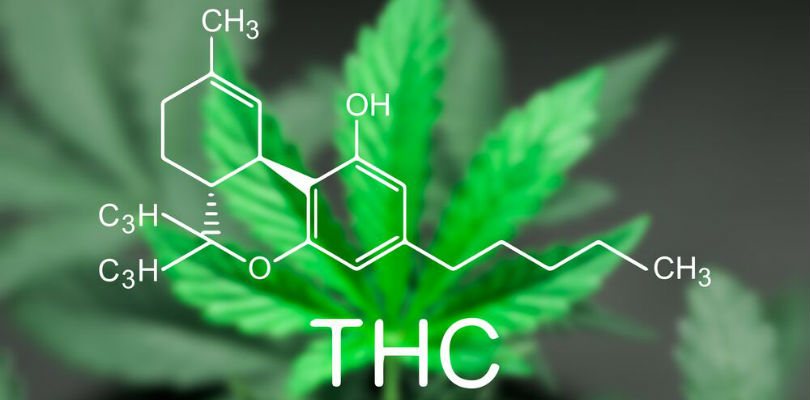
There isn’t enough evidence on whether or not it’s safe to expose an unborn baby to THC.
THC and fetal brain development
Another reason to avoid THC while pregnant is simply that there isn’t enough evidence on whether or not it’s safe to expose an unborn baby to it. THC is psychoactive and has been shown to cross the placenta. Scientists are concerned that this could have a detrimental effect on the fetus’s neurological development. THC is a cannabinoid, and it has the potential to hijack the receptors in a fetus’s developing brain that would normally interact with the body’s own naturally-produced cannabinoids at this stage of development. This has the potential to interfere with how the brain is “wired.”
However, another study highlights the interesting possibility that prenatal marijuana use could actually be good for a developing baby’s brain – but only when not used concurrently with other harmful substances, such as alcohol. In this study, children who had been exposed to varying combinations of marijuana, alcohol, methamphetamines, and nicotine in the womb were assessed at 4.5 years old. Researchers were specifically interested in how global motion perception (GMP), an area of visual perception involving big-picture movement, which is governed by a particularly sensitive part of the brain, would be affected. The children in this assessment who had been exposed to marijuana, not in combination with any of the other substances, outperformed all of the other groups, including those who had not been exposed to any of these substances at all. However, it did appear that concurrent fetal exposure to alcohol and marijuana had a detrimental effect on GMP.
Fetal development may be largely unaffected by cannabis use
So far, most research has determined no significant differences in developmental outcomes between children exposed to cannabis in the womb and those who were not. This includes a well-known study of rural Jamaican children whose mothers had used marijuana while pregnant, versus children with no cannabis exposure. The 44 children observed in this study were given standardized behavior assessments at 1, 3, and 30 days of age and standardized ability tests at ages 4 and 5 years old. Environmental factors (such as whether or not a child attended preschool) were taken into account. The only instance where a noticeable difference was noted between the two groups (each roughly half of the total sample) was at the 30-day visit, where the children who had been exposed to marijuana actually scored higher in the specific categories of autonomic stability and reflexes, and also showed lower levels of general irritability.
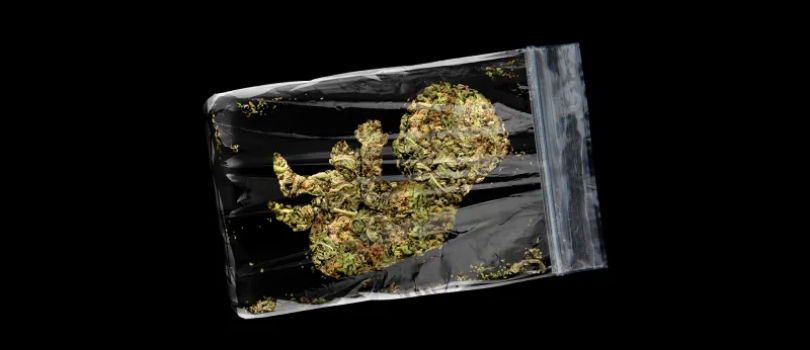
Most research has determined no significant differences in developmental outcomes between children exposed to cannabis in the womb and those who were not.
THC and breastfeeding
The American Academy of Pediatrics (AAP), recommends that mothers who breastfeed their babies also abstain from marijuana. This recommendation is based on an AAP study showing THC in a majority of breastmilk samples taken from mothers who had used marijuana, even up to 6 days following use. THC is easily stored in fat, which breastmilk is high in. When a baby is exposed to THC, it may be stored in his or her brain and body fat for some time. At this time, the effects of THC on developing infants are still unknown, though its psychoactive characteristics naturally draw concern. If a breastfed infant tests positive for THC, there may be legal repercussions, including loss of child custody. Unlike alcohol, which disappears from the mother’s body in a matter of hours (depending on how much she has consumed), THC is stored in fat and can remain in the body for many days after use. This means that “pumping-and-dumping” breastmilk after cannabis use is not a viable option. Considering THC’s unclear effect on newborns and unfavorable legal status, abstinence from all products containing THC while breastfeeding is recommended.
Effects of marijuana on the fetus
At this point, there isn’t enough research to say for sure if marijuana has any significant effect on a fetus – in the womb or later in life.
There have been studies showing babies who were prenatally exposed to marijuana to be more likely to have behavioral or attention problems as older children, to be born preterm, or at lower than normal birth weights. However, these negative outcomes were only significant in babies whose mothers had also smoked tobacco or used alcohol during their pregnancies. Once those factors were accounted for, no significant link between marijuana and low birth weights or preterm birth has been found. It is worth noting that marijuana appears to enhance the effects of other substances on a developing fetus, though there is not yet enough evidence to say for sure. If you decide to use marijuana during pregnancy, it’s a good idea to abstain from alcohol, tobacco, and any other recreational drugs (all of which are contraindicated during pregnancy, anyway!).
Can weed affect a pregnancy test?
Weed does not have any effect on the accuracy of pregnancy tests. Pregnancy tests work by detecting whether the level of a hormone called human chorionic gonadotropin (hCG) is elevated or not. Higher levels of hCG encourage the body to produce the appropriate levels of estrogen and progesterone to maintain a pregnancy. Marijuana has no effect on hCG levels and does not interfere with the accuracy of detection.
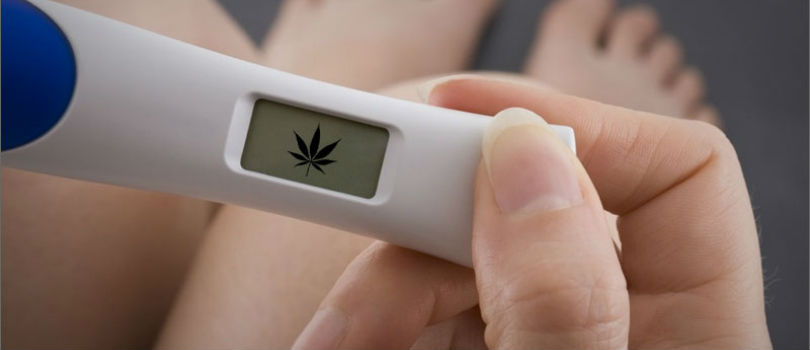
Weed does not have any effect on the accuracy of pregnancy tests.
Marijuana and pregnancy – the final verdict
More research is needed to say for sure if fetal exposure to cannabis, or any of its individual cannabinoids, is safe. Considering this, and the unfavorable legal atmosphere surrounding use of marijuana while pregnant or breastfeeding, pregnant women should avoid using marijuana wherever possible. If expectant mothers do decide to continue using weed, smoking it should be avoided, and substituting CBD-only products for “regular” cannabis may be safer for the fetus. CBD products that do not contain THC can be used legally during pregnancy, though their degree of safety is still unknown. Many women do use marijuana for effective relief of some unpleasant pregnancy side effects, but it’s important to consider the physical and legal risks when making that decision.
